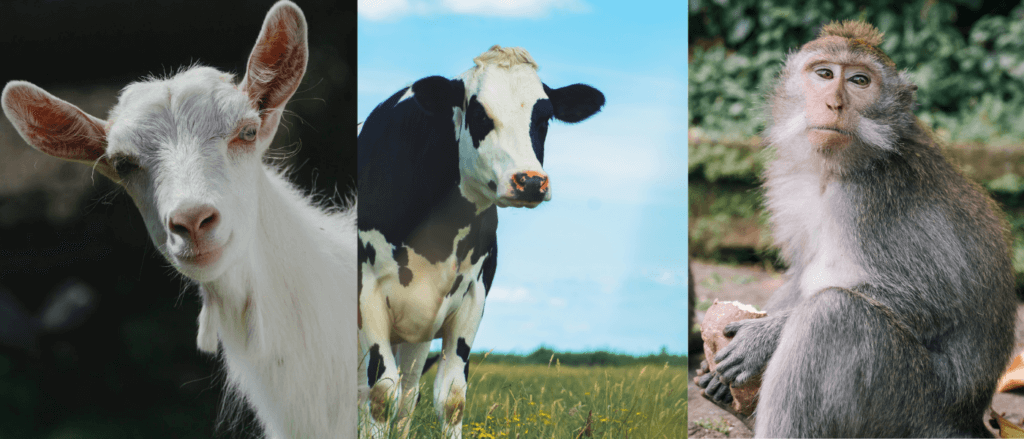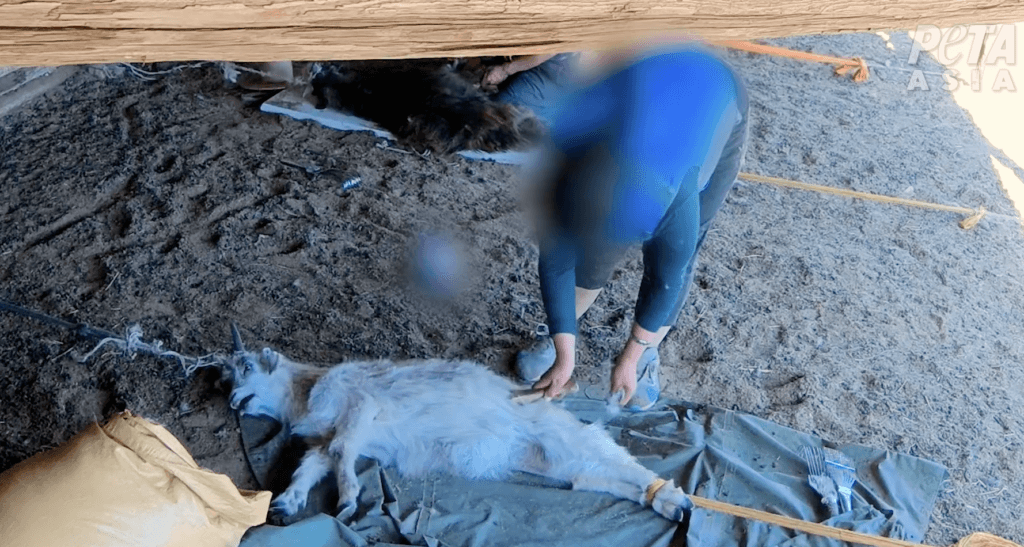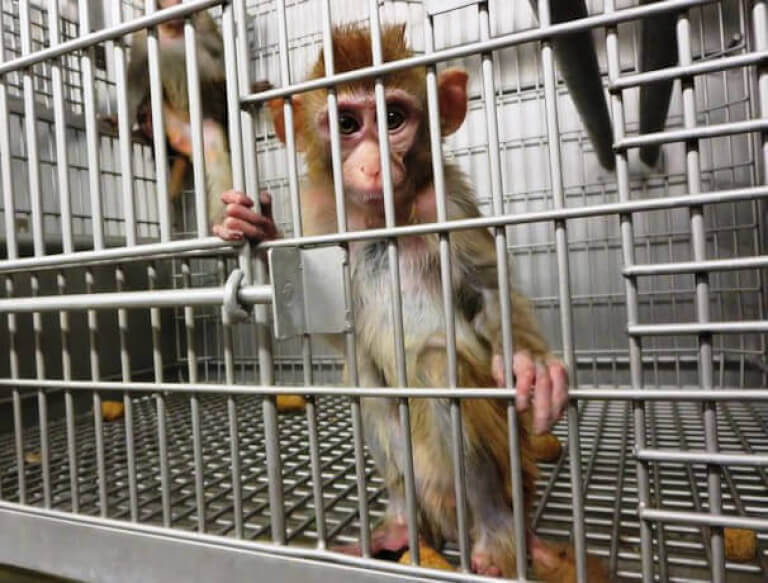
Ahead of the busiest shopping day of the year, PETA is challenging consumers everywhere to think before they buy and say NO to industries that exploit animals. No product is worth ripping hair from a goat for cashmere, tearing a mother cow’s newborn away from her in the dairy industry, or tormenting and killing monkeys in pharmaceutical tests.

PETA’s New Ads Are ‘Too Much’ for TV
PETA’s new thought-provoking “Too Much” ads—featuring realistic-looking computer-generated animals—confront consumers with the true cost of cashmere and dairy stolen from other animals and pharmaceuticals that were tested on them. To spread the message that our fellow animals aren’t ours to exploit or kill, PETA contacted TV stations across the U.S.—but some of them found the animated images in our ads to be “too controversial” or “too graphic” to broadcast.
If computer-generated animals are “too much” for TV, imagine how consumers would react to seeing real footage of the widespread abuse and killing in these industries.
How Much for Cashmere?
credits
(LIVE ACTION)
Prod. Company: Push Pull
Director: Angel Apostolski
Writer/ Creative Director: Christian Carl
DOP: Nenad Boroevich
Producer: Stela Pavlova
Talent: Greta Stefanova
1st AD: Krassimir Hazarbassanov
Production Designer: Ketty Marinova
Stylist: Sirma Chausheva
Hair: Ivayla Stancheva
Makeup: Ventzislava Koycheva
Color grading: Todor Georgiev
VFX: Dimitar Itzkov – Jimmy
Music & Sound Design: Kaloyan Dimitrov
(CGI)
Prod. Company: Antepost
PETA Asia’s investigations into the cashmere industry in China and Mongolia—where 90% of the world’s cashmere comes from—revealed horrific cruelty. Goats screamed in pain and terror as workers held them down and ripped the hair out of their sensitive skin, leaving them traumatized and sometimes bloody. Then, when they could no longer grow enough hair to be profitable, workers dragged them through the slaughterhouse, bashed them in the head with a hammer, slit their throats, and left them to bleed to death.

Investigators later visited two cashmere operations certified by the deceptively named Sustainable Fibre Alliance, where they observed the same cruelty and intense suffering—showing again that clothing derived from animals is not sustainable or even remotely humane and will never be rid of exploitation and rampant abuse, no matter what “standards” are adopted.
Goats are gentle, curious animals who have rich emotional lives and form strong social connections. They are not ours to turn into sweaters. Visit PETA’s guide to vegan clothing, and take action for goats used and killed for cashmere:
How Much for Dairy?
credits
(LIVE ACTION)
Prod. Company: Push Pull
Director: Angel Apostolski
Writer/ Creative Director: Christian Carl
DOP: Nenad Boroevich
Producer: Stela Pavlova
Talent: Barry-John Daly
1st AD: Krassimir Hazarbassanov
Production Designer: Ketty Marinova
Stylist: Sirma Chausheva
Hair: Ivayla Stancheva
Makeup: Ventzislava Koycheva
Color grading: Todor Georgiev
VFX: Dimitar Itzkov – Jimmy
Music & Sound Design: Kaloyan Dimitrov
(CGI)
Prod. Company: Antepost
A holiday charcuterie board isn’t complete without an assortment of cheeses, but make sure you choose vegan options that don’t come from exploited, abused mother cows.
Mother cows are nurturing and fiercely protective of their young, but the dairy industry robs them of the chance to bond with their babies. Dairy farms tear calves from their mothers when they’re just a day old, then use the mother cows as milk-producing machines, forcing them into grueling and stressful daily milking regimens. When they can no longer produce enough milk to be profitable—at only 4 or 5 years of age—they’re sent to slaughter. Cheese is a product of this extreme cruelty and violence.
When prepping for holiday parties, ditch the animal-derived dairy and go vegan. See PETA’s tips for how to make a vegan charcuterie board, and order a free vegan starter kit:
How Much for Prescriptions?
credits
(LIVE ACTION)
Prod. Company: Push Pull
Director: Angel Apostolski
Writer/ Creative Director: Christian Carl
DOP: Nenad Boroevich
Producer: Stela Pavlova
Talent: David Amitaye
1st AD: Krassimir Hazarbassanov
Production Designer: Ketty Marinova
Stylist: Sirma Chausheva
Hair: Ivayla Stancheva
Makeup: Ventzislava Koycheva
Color grading: Todor Georgiev
VFX: Dimitar Itzkov – Jimmy
Music & Sound Design: Kaloyan Dimitrov
(CGI)
Prod. Company: Antepost
Virtually all new pharmaceutical drugs are tested on a variety of animals over many years. Although the passage of the FDA Modernization Act late last year allows the FDA to approve new medications without animal testing, the agency has not yet done so—even though drugs that appear safe and effective in animal studies fail 95% of the time to work in humans.
Our fellow animals deserve respect and autonomy. They feel pain and struggle desperately to keep from being cut into, forced to inhale toxic fumes, or imprisoned for life in laboratory cages for unreliable medical experiments. Superior alternatives to tests on animals—like human cell testing and computer modeling methods—are far more efficient and dependable and don’t kill billions of animals or waste billions in taxpayer dollars.
Don’t donate to organizations, charities, or institutions—including schools like the University of California–Davis—that support tests on animals.

Urge Congress to support PETA’s Research Modernization Deal (RMD), a superior plan for animal-free research that will lead more quickly to treatments and cures for human diseases:
Don’t Just Save Money—Save Animals
As consumers, we collectively have the power to push back against industries that exploit and kill our fellow animals—and the first step is to shop with compassion.
This Black Friday and all year round, take action for animals with every purchase you make. Don’t buy animal-derived clothing or food, and push lawmakers to support human-relevant, non-animal laboratory testing. Click the button below for more ways to save the lives of animals every day:
